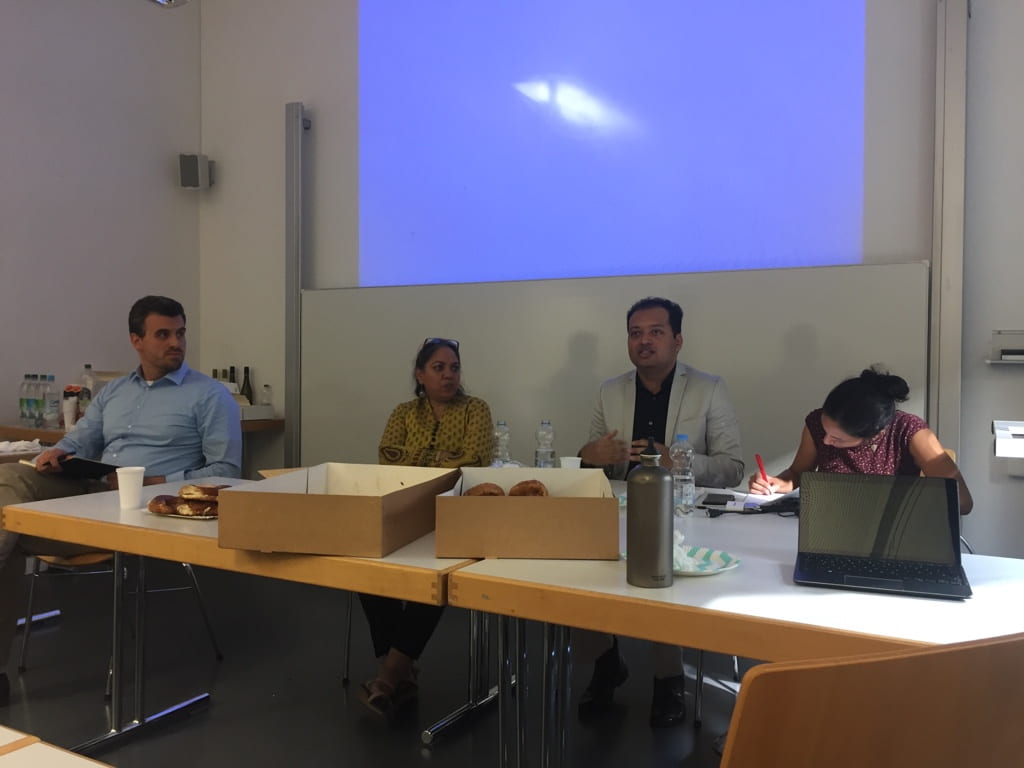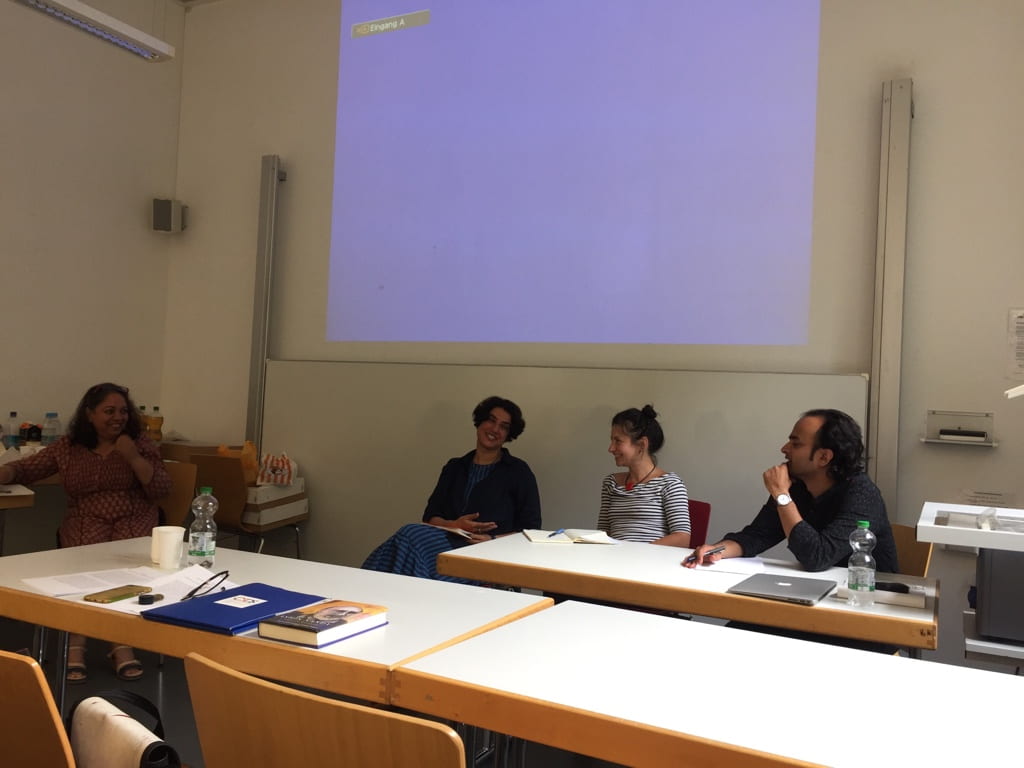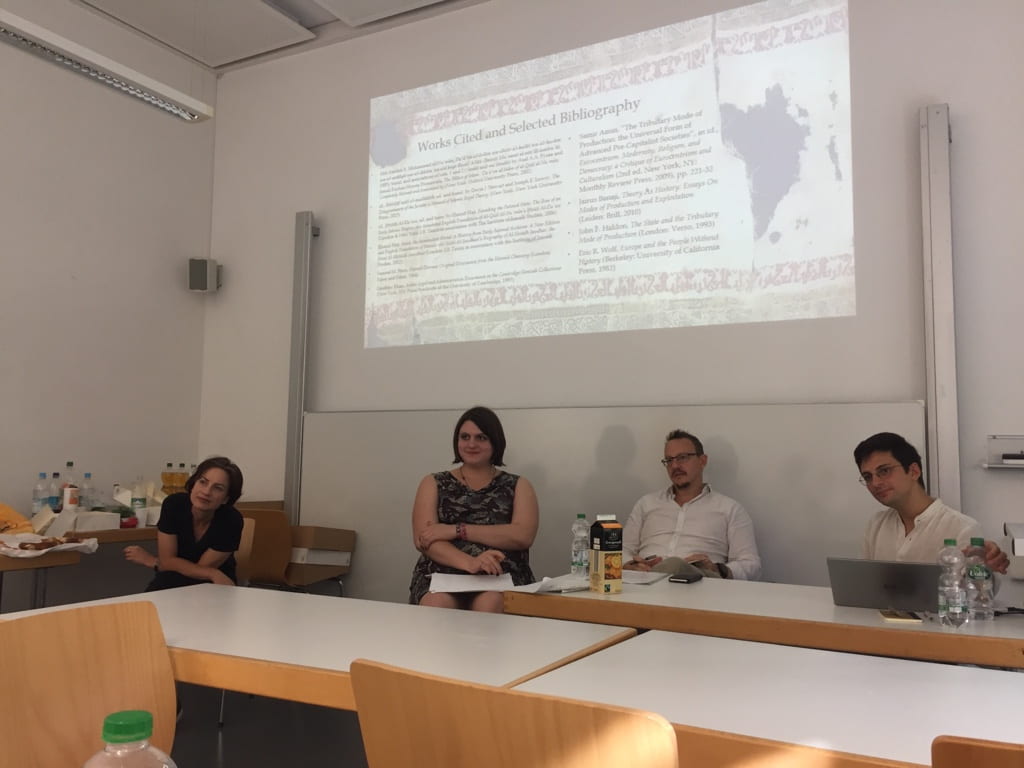by contributing writer Philipp Sperner
While the need to study notions of power, sovereignty and rule from a global perspective has been widely acknowledged, the research is all too often limited by its strong dependence on the disciplinary framework of area studies and Eurocentrism. One of the aims of the conference, titled “Mastery, Ownership, Divinity: Self and Power in Transregional and Transtemporal perspective”, organized by Milinda Banerjee and held at the Ludwig-Maximilians-Universität (LMU) in Munich on 18th and 19th September 2018 was to work towards developing alternative frameworks. Another aim of the conference was to emphasise the intersections of political theology and political economy and, in empirical terms, to relate focused case studies to longue durée histories and transregional developments.
One critique, shared by several of the speakers, concerned current hegemonic theories of the emergence and development of the state. The issue was approached by Robert Yelle (LMU) through an analysis of the connections between patriarchy, property, and religion. By critically revisiting the 19th-century discourse on the alleged shift from matrilineality or matriarchy to patrilineality and patriarchy as the basis for statehood, the talk emphasized the importance of religious mythology and sacrifice for the constant (re)production of patriarchal rule. Yelle further argued that the hierarchy established through these forms of “patriarchal biolopolitics” is expressed and perpetuated through the family as the central institution of absolute patriarchal sovereignty, which extends not only over women and children, but crucially also over slaves and all forms of property.
The notion of (patriarchal) sovereignty as being not merely a political but a quintessential politico-economic relationship was further developed in the talk by Devin Singh (Dartmouth College). He argued that debt slavery and patterns of debt management were intricately connected to the formation of (state) sovereignty. Since enslaved citizens could no longer be subjected to the paying of taxes, the state had a significant interest in limiting forms of private debt servitude. On the other hand, however, Singh maintained that early states also significantly depended on forms of debt slavery in order to assert direct control over labour. He then showed how debt slavery was legitimized through a political theology that portrayed god as the ultimate creditor to whom everyone is indebted and who alone has the power to forgive one’s debts.
The manifold connections between the (re)production of sovereignty and state formation were further explored in talks by Michael Kinadater (LMU), Tanuja Kothiyal (Ambedkar University Delhi) and Aditi Saraf (LMU). While Kinadeter traced connections between the politico-cultural developments in China, Korea and India and the emergence of centralized power and its ideology in Japan, Kothiyal and Saraf examined conditions of statehood and state making in borderland regions in South Asia. On the basis of her research into the history of authority and control in the Thar desert from 1400 to 1800, Kothiyal contended that rather than understanding statehood as being predicated on a single sovereign power, it should instead be seen as constantly being re-negotiated and re-inscribed into a complex network of various forms of political, religious and economic authority. That such practices of negotiation also rely on the successful adoption of an adequate terminology became apparent in the talk by Aditi Saraf, who showed how the use of the Urdu term “hifazat”, denoting “care”, “trust”, “guardianship” and “safekeeping”, allowed the princely state of Jammu and Kashmir to tie the two different discourses on protection and rule together. The state thus adopted a legal discourse on property rights that was far stricter than it would have otherwise been possible within the sphere of British imperial rule.

Image 1:
Simon Cubelic (who chaired panel 2), Tanuja Kothiyal, Milinda Banerjee
and Aditi Saraf.
Another topic that was taken up by several talks at the conference was the changing notion of who could become (a) sovereign. In his talk on “Divine Subalterns and Sovereign Labour“, Milinda Banerjee (LMU) argued that the idea of divinity as something pertaining to every (human) being has not only been hugely influential for popular quasi-democratic mass movements in the past but serves as an important argument for the emancipation of subaltern agents up to this day. By analysing a range of moments in 19th– and 20th-century India – from peasant revolts, labour struggles, and the movement for women’s rights to more recent movements for land rights – Banerjee demonstrated how various actors critically engaged with the nexus of divinity and state sovereignty, and succeeded in claiming their own sovereignty via the declaration of a universal divinity of many, or even all, humans.

Image 2:
Tanuja Kothiyal (who chaired panel 4), Ananya Vajpeyi, Anastasia
Piliavsky and Bhrigupati Singh.
A different but closely connected approach to claiming one’s right to authority and sovereignty was analysed by Ananya Vajpeyi (Centre for the Study of Developing Societies, Delhi) in her talk on the history of the term “Śūdra”. The term is used to designate the lowest category of the four-tier social hierarchy most often referred to as the “caste system”. By revisiting the history of the first Maratha king Shivaji (1630-80 CE), Vajpeyi explored how someone who had nominally belonged to the lowest strata of society managed to change and transgress the order of the social hierarchy by claiming royal ancestry. While Shivaji’s successful effort to recast himself as (divinely sanctioned) king and sovereign was portrayed as a self-emancipatory act by the 19th-century social reformer Jyotiba Phule, the Dalit leader, activist and “father of the Indian constitution”, B.R. Ambedkar, was more ambivalent in his analysis of Shivaji’s rulership.
The conference also included engaging discussions on practices that helped establish and sustain hierarchies of authority and control. Rather than simply criticising the existence of such hierarchies, Anastasia Piliavsky (University of Cambridge), instead made a compelling case for trying to understand how and why hierarchy is indeed often seen as a social and political good. Piliavsky gave a vivid account of her ethnographic observations of the daily meetings of a politician with his constituents in the Indian state of Rajasthan. She argued that the hierarchies that structured these interactions did not translate into a straightforward rule or mastery of one person over the other, but instead corresponded to an intimate and comprehensive responsibility that the politician had towards his constituents. Understanding how such hierarchies are embedded into democratic systems might enable us, Piliavsky claimed, to better understand the growing demand for strong political leaders today.
A different take on practices establishing and reinforcing social hierarchies was presented by Jules Gleeson (University of Vienna and FOVOG, TU Dresden). Her talk focused on normative shaming practices at the Great Lavra monastery established by Athanasios of Athos. Gleeson argued that through deliberate stigmatization and shaming of disobedient monks Athanasios sought to establish a community based on a Christ-like humility and wilful self-humiliation conducive to a rigid hierarchy. In contrast to practices of shaming and denigration, the talk by Ceyda Karamursel (SOAS University of London) demonstrated how the deliberate use of seemingly “softer” vocabulary served to legitimize and uphold the hierarchy between slaves and masters in the late Ottoman Empire. Rather than framing the hierarchy in terms of the human/property distinction commonly drawn on before, Karamursel argued that slavery was legitimized and naturalised by being portrayed as resulting from natural weakness and thus sanctioned by god. Magnus Fiskesjö (Cornell University) argued that the pervasive surveillance and constant assessment of citizens in contemporary China is indeed a sign of a qualitatively different form of rule that might be connected to exhibitionist and quasi-confessional practices on social media.

Image 3:
Annabel Brett (who chaired panel 5), Jules Gleeson, Simon Yarrow and
Lorenzo Bondioli.
In her talk, Annabel Brett (University of Cambridge) focused on the notion of “use”, and especially the use of animals, in the Western natural law tradition. Beginning with Thomas Aquinas, the concept of “use” played an important role for the distinction between God and the physical world on one side and between humans and animals on the other, Brett argued. While “use” was seen as relying on a physically-embodied being and thus could not be something God “does”, it was also regarded as tied to the notion of a rational action directed at a specific goal or aim. Animals, therefore were not capable of “use”. Seen from this perspective, the very notion of what it means to have ownership of something and mastery over something is inextricably tied to the human-animal relationship.
This focus on animals as constitutive of regimes of human mastery was reinforced by Kresimir Vukovic (British School at Rome) in his analysis of different enunciations of control over, and taboos against, cattle, wolves, and dogs among Indo-European (especially Roman and Indian) cultures. Vukovic suggested that the structural similarities, such as the distinction between warriors and priests based on different forms of mastery over animals, might be seen as indicative of a shared political theology and a common framework of power relations.
The relationship between political economy and political theology was strongly foregrounded in the talks by Simon Yarrow (University of Birmingham) and Lorenzo Bondioli (Princeton University). While Yarrow explored the role of money and saints’ relics in twelfth-century Latin Christendom, Bondioli focused on the period of Fatimid state-making in tenth-century North Africa and mapped out the integral relation between taxation regimes, property rights and forms of political discourse.
A different kind of spiritual economy was analysed by Bhrigupati Singh (Brown University) in his interrogation of procedures undertaken by patients suffering from mental illness, especially in Sufi shrines in Northern India. Singh underlined the various forms of symbolic exchange and transfer of persons, goods and ‘afflictions’ between healers, treatment seekers and family members. This opened up new ways of understanding mental illness, radically different from an individualistic approach that foregrounds the role of the individual patient.
While the conference covered a broad range of time periods, regions and themes, it succeeded in bringing the speakers from various fields into an engaged conversations with each other. This became especially apparent in the responses to a question raised in the general discussion at the end of the conference, regarding the function of “sovereignty” in linking mastery, ownership and divinity. While Anastasia Pilliavsky, Annabel Brett and Ananya Vajpeyi emphatically emphasised the need to diversify the conceptual toolkit, others argued in favour of the use of “sovereignty” as a kind of placeholder that needs to be defined and described anew within every specific context. Apart from providing a stimulating atmosphere for several more fruitful discussions – such as on the competing or probably even irreconcilable relationship between transregional and transtemporal perspectives or on the productive use of a dialectic approach to visualize the complexities of political and economic theology – the conference has probably succeeded most effectively in providing a platform for truly intersectional conversations based on rigorous inquiries into situated case studies and sharp theorization.
Philipp Sperner is a PhD student at the Research Group “Globalization and Literature”, Ludwig-Maximilians-Universität Munich. He can be contacted at philipp.sperner@posteo.net
The featured image at the top of this page comes from the Conference’s poster, available at: https://www.japan.uni-muenchen.de/personal/gastwissenschaftler/banerjee/mastery_ownership_divinity/mod_-_poster.pdf




Leave a Reply